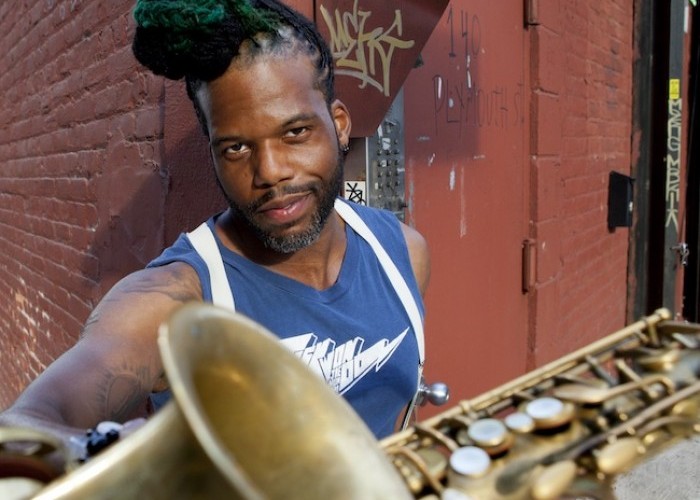Jan 13, 2026 2:09 PM
More Trump-Kennedy Center Cancellations
The fallout from the renaming of the John F. Kennedy Center for the Performing Arts to include President Donald…

Benjamin possessed a fluid, round sound on the alto saxophone, and he was often most recognizable by the layers of electronic effects that he put onto the instrument.
(Photo: Bill Douthart)Casey Benjamin, the alto saxophonist, vocalist, keyboardist and producer who stamped his distinctive sounds on the Robert Glasper Experiment, Stefon Harris’ Blackout and several other bands, died March 30 in Maryland. He was 45.
His death was confirmed by his manager, Sapna Lal, who spoke to several outlets including The Huffington Post and WRTI radio. Cause of death is still undetermined, but it occurred while Benjamin was recovering from surgery.
A native New Yorker, Benjamin possessed a fluid, round sound on the alto saxophone and a unique sense of phrasing. However, he was often most recognizable by the layers of electronic effects that he put onto the instrument, especially his tendency to add a doubling lower voice onto his lines. Benjamin was similarly distinct in his use of vocoder-processed vocals, often manipulated through the keytar he played onstage when not playing saxophone.
As these effects suggest, Benjamin was a sonic explorer, constant in his pursuit of new timbres and textures through which to express himself. In particular, it made him an indispensable part of the Glasper Experiment (where he often provided the “experiment”).
“He was the epitome of what it means to be unique and one of a kind,” Glasper told Rolling Stone. “The true meaning of a genius at his craft. There is no Robert Glasper Experiment without him. The world lost a giant, and I lost a brother.”
In addition to Glasper’s group, Benjamin was a vital part of Harris’ Blackout and worked as well with Kris Bowers and Derrick Hodge. He was not confined to jazz; Benjamin also had credits with Kendrick Lamar, Lupe Fiasco, A Tribe Called Quest, Beyonce and Solange.
“Ninety-nine percent of my career I’ve been hired to be myself,” he told HighBreedMusic in a 2018 interview. “‘I want Casey Benjamin; just let him do what he does.’ Because I’ve created this lane for myself, I created this sort of thing that only I can do.”
Tributes to Benjamin also poured in across social media. “Casey Benjamin, thank you for inspiring me, for being a light in my life, and for your unbelievable influence on the music world,” Hodge wrote on Facebook. “I will carry your smile with me, brother. And we will collectively honor and carry your legacy with us.”
“It’s so hard to say how much this hurts right now, but I’m thankful for you,” Jaleel Shaw posted on X. “It was amazing watching you grow into such an incredible, super talented, hard-working, innovative musician. I’ll miss you. You were truly one of one.”
Casey Brian Benjamin was born Oct. 10, 1978, in Brooklyn, New York, and was raised in Jamaica, Queens. His parents were immigrants — his father from Grenada, his mother from Panama — and he grew up immersed in the city’s Afro-Caribbean diaspora. He first began playing piano at the age of 8, moving to saxophone in the fifth grade and ultimately graduating from New York’s Fiorello H. LaGuardia High School of Music and Performing Arts. He then attended the New School, where he met Glasper and drummer Terreon Gully (through whom he joined Harris’ band).
From there, his career began in earnest. He collaborated with Glasper in the late 1990s and made his first recordings with vocalist Pucci Amanda Jhones. The Glasper Experiment formed in 2004, with Benjamin as a founding member; it was with the band that he became a Grammy winner for the 2012 album Black Radio.
Benjamin is survived by his partner, Whitley Davis; his parents, Gentle and Julieta Benjamin; and his siblings Kevin and Nicole Benjamin and Cristina King. DB

Belá Fleck during an interview with Fredrika Whitfield on CNN.
Jan 13, 2026 2:09 PM
The fallout from the renaming of the John F. Kennedy Center for the Performing Arts to include President Donald…

Peplowski first came to prominence in legacy swing bands, including the final iteration of the Benny Goodman Orchestra, before beginning a solo career in the late 1980s.
Feb 3, 2026 12:10 AM
Ken Peplowski, a clarinetist and tenor saxophonist who straddled the worlds of traditional and modern jazz, died Feb. 2…

The success of Oregon’s first album, 1971’s Music Of Another Present Era, allowed Towner to establish a solo career.
Jan 19, 2026 5:02 PM
Ralph Towner, a guitarist and composer who blended multiple genres, including jazz — and throughout them all remained…

Rico’s Anti-Microbial Instrument Swab
Jan 19, 2026 2:48 PM
With this year’s NAMM Show right around the corner, we can look forward to plenty of new and innovative instruments…

Richie Beirach was particularly renowned for his approach to chromatic harmony, which he used to improvise reharmonizations of originals and standards.
Jan 27, 2026 11:19 AM
Richie Beirach, a pianist and composer who channeled a knowledge of modern classical music into his jazz practice,…